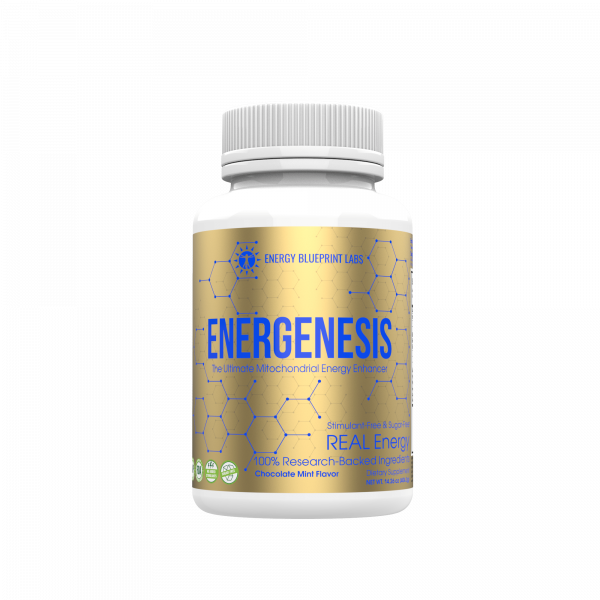There might not be a more controversial ingredient on the market than resveratrol. It’s been hyped about for years due to early research in animals and test-tubes suggesting it extends lifespan and attenuates many of the aging processes.
In particular, this early research suggested resveratrol acted on sirtuins and several other molecular targets to reduce oxidative stress and inflammation, promote DNA repair and autophagy, and stimulate mitochondrial biogenesis — all of which lead to improved metabolic health and extended lifespan [1].
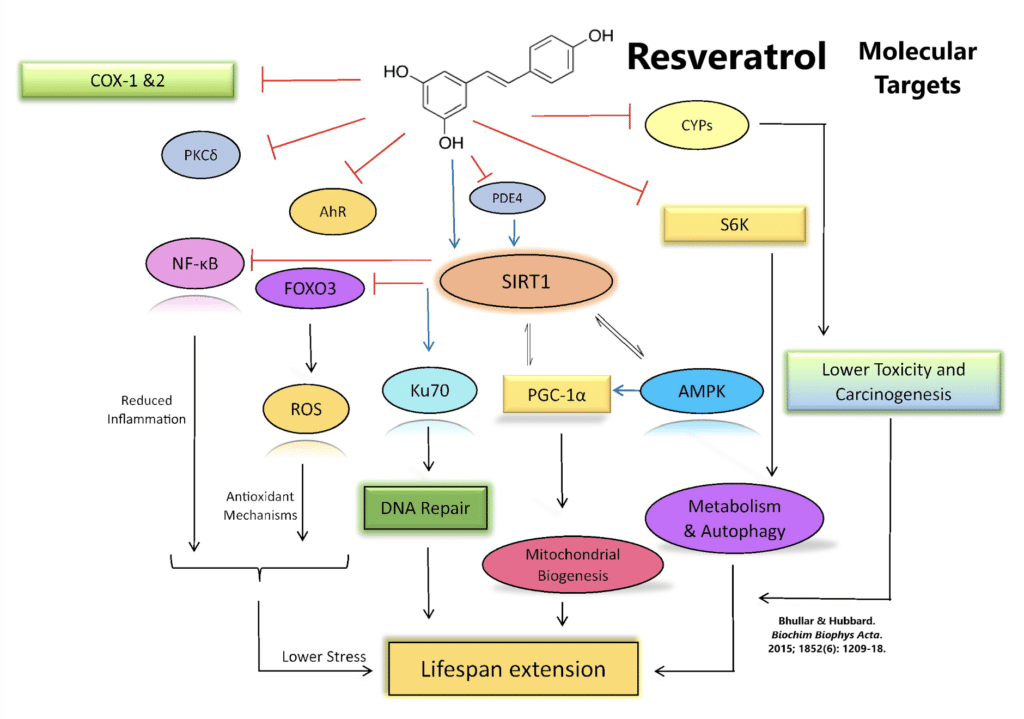
Of course, at the time, there weren’t any human clinical trials around to support such effects, so its purported benefits were met with resistance from many evidence-based circles. That’s really a downside of giving something a lot of hype, often more than it needs or warrants — there will be many who throw the baby out with the bathwater.
I’ll be the first to tell you that resveratrol isn’t a panacea, and there is certainly a lot of hyperbolic language surrounding this molecule. But I’ll also be the first to tell you that, despite all the nonsense surrounding resveratrol, it still has remarkable benefits as a supplement for supporting mitochondrial function, and that’s why we’ve made it one of the ingredients in our mitochondrial energy formula, Energenesis.
For Mitochondria, More Isn’t Better
One of the big issues surrounding resveratrol is dose and bioavailability. Many of the molecular mechanisms and observed outcomes in animals require high resveratrol concentrations that simply aren’t feasible to obtain in humans unless you inject the stuff directly into your bloodstream [2].
At the same time, high doses aren’t always ideal. For almost every outcome that resveratrol has been tested for, there’s a hormetic relationship where too little has no effect and too much is either useless or harmful [3].
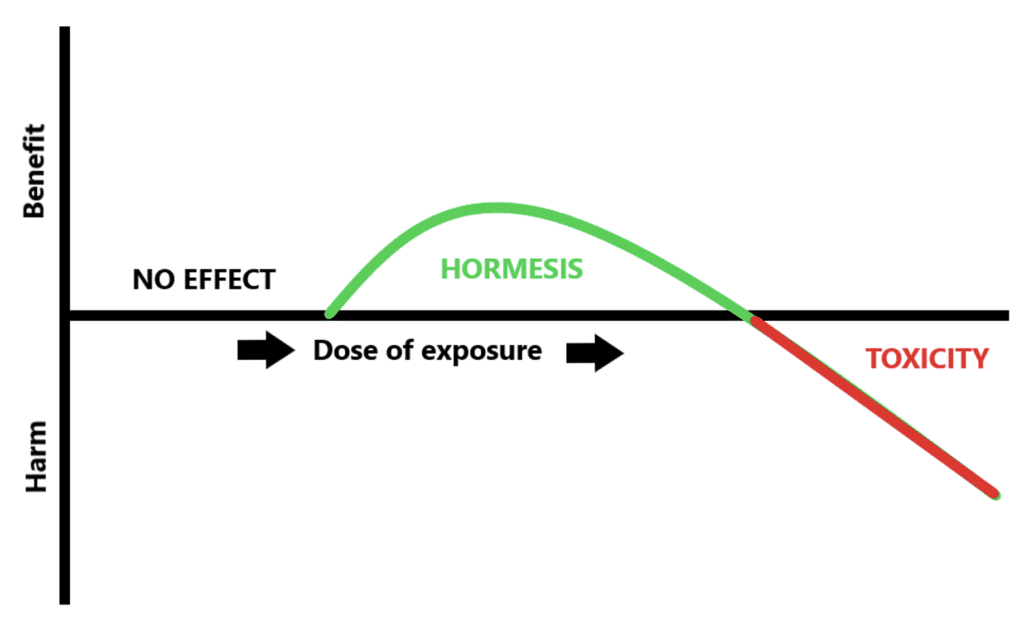
Thankfully, when it comes to mitochondrial function, more isn’t better and we can actually reap most of resveratrol’s benefits with pretty low doses. This was made clear in 2017 when Yuki Mizuguchi published a study where he and his colleagues from the Japanese National Center of Neurology and Psychiatry took cells from patients with genetic mitochondrial disorders and incubated them in different doses of resveratrol [4].
The researchers found a clear hormetic effect whereby the lowest tested dose slightly benefited cell growth and survivability, with the effect disappearing as the dose increased and ultimately entered into a toxic range where cell growth was strongly inhibited.
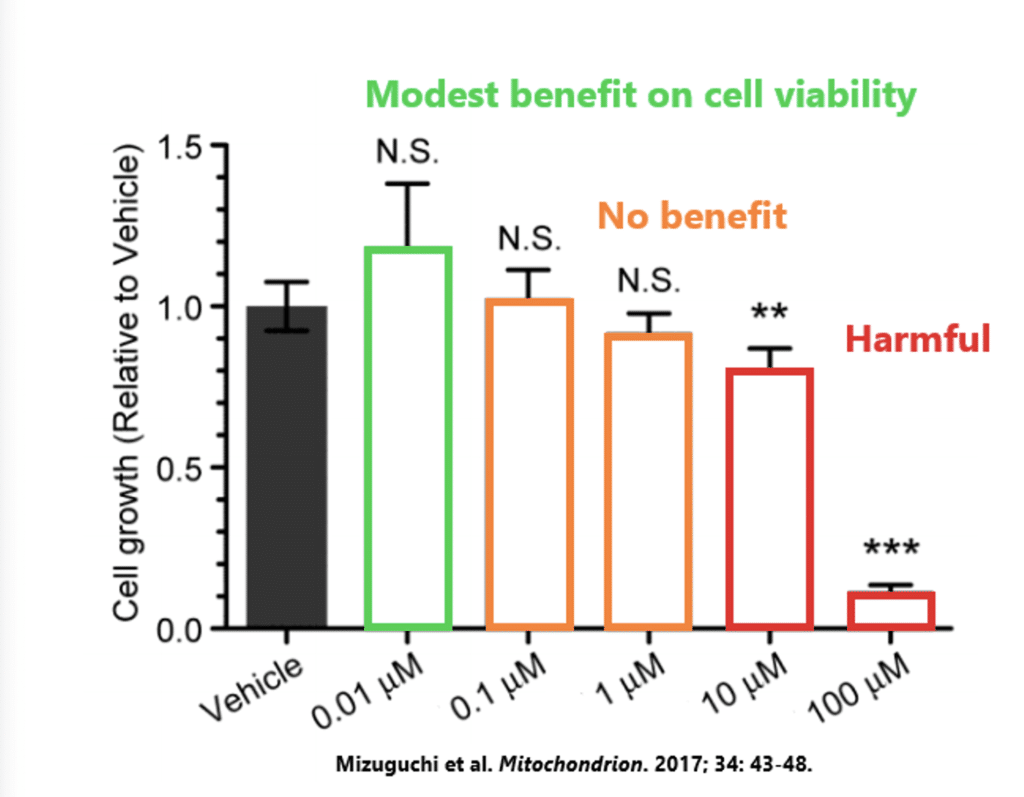
To help explain this cell growth benefit, the researchers then looked to the mitochondria of these cells and some healthy cells that served as controls in their experiment. Expectedly, the mitochondrial mutations reduced energy production by 50–85% compared to healthy mitochondria. Yet, in both the healthy and mutated mitochondria, low-dose resveratrol increased energy production by 40–100%!
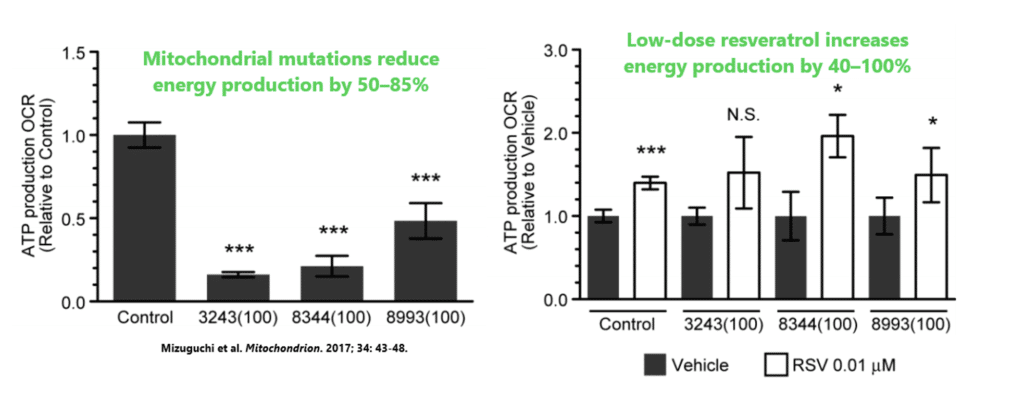
In short, you don’t need a lot of resveratrol to experience a mitochondrial benefit, and this makes reaping the benefits of resveratrol both realistic and fairly easy. For example, just one month of supplementing with 150 mg/d of resveratrol leads to significant increases in the activation of several mitochondrial regulators, including AMPK, SIRT1, and PGC-1α, while also increasing the ability of mitochondria to oxidize fat as an energy source [5].
Increases in SIRT1 and AMPK were also seen in adults with type 2 diabetes after supplementing with 3000 mg/d of resveratrol for 12 weeks, which coincided with an 8% increase in energy expenditure, likely from the increase in mitochondrial function [6].
Lastly, it’s worth mentioning that resveratrol supplementation increases mitochondrial adaptations to exercise [7,8]. In elderly adults undergoing 12 weeks of resistance and endurance training, supplementing with 500 mg/d of resveratrol was superior to a placebo for improving aerobic fitness, muscular strength, size, and fatigue resistance, and mitochondrial density of skeletal muscle [7].
Resveratrol Improves Cardiometabolic Health
Both through improving mitochondrial function and reducing oxidative stress and inflammation, resveratrol also benefits numerous parameters of cardiometabolic health, such as glycemic control and blood lipids.
This was made clear in a meta-analysis of 17 randomized controlled trials, which found improvements in insulin sensitivity, fasting glucose, LDL-C, and HDL-C in those with metabolic syndrome after supplementing with an average of just 250 mg/d of resveratrol for an average of just two months [9].
Other individual studies have confirmed these benefits in those with several different types of metabolic dysfunction:
- In adults with type 2 diabetes, supplementing with 10–2000 mg/d of resveratrol improved insulin sensitivity, blood lipids, and antioxidant capacity while reducing blood glucose, HbA1c, and oxidative stress after 4–8 weeks [10–14]. While even just the 10 mg/d dose led to benefits [10], the effects were most pronounced in those taking 500–1000 mg/d [12–14], with no significant benefit from increasing further to 2000 mg/d [11].
- In adults with type 1 diabetes, supplementing with 500 mg/d of resveratrol lowered fasting glucose, HbA1c, and oxidative stress after two months [15].
- In adults with non-alcoholic fatty liver disease, supplementing with 300–500 mg/d of resveratrol reduced the extent of liver damage, fasting glucose and insulin resistance, blood lipids, and markers of inflammation after three months [16–18].
- In adults at a high risk of developing cardiovascular diseases and taking a statin preventively, supplementing with a resveratrol-enriched grape extract significantly reduced blood lipids, oxidized LDL, and several markers of inflammation after 6–12 months [19,20].
- In adults with heart disease, supplementing with just 10 mg/d of resveratrol improved heart and endothelial function after three months [21].
- In overweight and obese adults, supplementing with 75–400 mg/d of resveratrol improved endothelial function and reduced endothelial inflammation [22–24].
Basically, if you are someone who is trying to overcome metabolic dysfunction and improve your health, then it’s likely that resveratrol will help after a couple months of consistent supplementation.
Resveratrol Fights Neurodegeneration
Another area of research where resveratrol shows promise is in slowing age-related declines in cognitive function and the development of neurodegenerative disorders like Alzheimer’s disease.
Brain cells are highly susceptible to oxidative stress and mitochondrial dysfunction due to their high energy requirements, and several lines of evidence have shown that resveratrol protects neurons and other brain cells from both by increasing energy production, mitochondrial membrane integrity, and antioxidant status [25].
For example, in healthy older adults, just 200 mg/d of resveratrol increased functional connectivity of the hippocampus — a key brain region involved in memory — and improved memory scores on cognitive tests after six months [26]. Similarly, 150 mg/d of resveratrol increased cognitive performance, particularly on memory tests, after 14 weeks of supplementation in healthy postmenopausal women [27].
The benefits are apparent in those with Alzheimer’s disease as well. The longest and largest study to date had over 100 adults with Alzheimer’s supplement with 500–2000 mg/d of resveratrol over the course of year [28,29]. The researchers found that resveratrol attenuated disease progression, preserved blood-brain barrier integrity, and reduced neuroinflammation compared to a placebo.
Summary
Resveratrol is a molecule whose claim to fame began with studies showing it could help extend lifespan in animals. While such data doesn’t exist in humans, clinical research has shown that it improves mitochondrial function, metabolic health, and brain health.
The science overwhelmingly shows that resveratrol is a powerful mitochondrial nutrient that can fight fatigue, memory loss, and metabolic dysfunction. That’s why we’ve made it one of the cornerstone ingredients in our mitochondrial energy formula, Energenesis.
References
- Bhullar KS, Hubbard BP. Lifespan and healthspan extension by resveratrol. Biochim Biophys Acta. 2015;1852:1209–18.
- Smoliga JM, Baur JA, Hausenblas HA. Resveratrol and health–a comprehensive review of human clinical trials. Mol Nutr Food Res. 2011;55:1129–41.
- Calabrese EJ, Mattson MP, Calabrese V. Resveratrol commonly displays hormesis: occurrence and biomedical significance. Hum Exp Toxicol. 2010;29:980–1015.
- Mizuguchi Y, Hatakeyama H, Sueoka K, Tanaka M, Goto Y-I. Low dose resveratrol ameliorates mitochondrial respiratory dysfunction and enhances cellular reprogramming. Mitochondrion. 2017;34:43–8.
- Timmers S, Konings E, Bilet L, Houtkooper RH, van de Weijer T, Goossens GH, et al. Calorie restriction-like effects of 30 days of resveratrol supplementation on energy metabolism and metabolic profile in obese humans. Cell Metab. 2011;14:612–22.
- Goh KP, Lee HY, Lau DP, Supaat W, Chan YH, Koh AFY. Effects of resveratrol in patients with type 2 diabetes mellitus on skeletal muscle SIRT1 expression and energy expenditure. Int J Sport Nutr Exerc Metab. 2014;24:2–13.
- Alway SE, McCrory JL, Kearcher K, Vickers A, Frear B, Gilleland DL, et al. Resveratrol Enhances Exercise-Induced Cellular and Functional Adaptations of Skeletal Muscle in Older Men and Women. J Gerontol A Biol Sci Med Sci. 2017;72:1595–606.
- Polley KR, Jenkins N, O’Connor P, McCully K. Influence of exercise training with resveratrol supplementation on skeletal muscle mitochondrial capacity. Appl Physiol Nutr Metab. 2016;41:26–32.
- Sergi C, Chiu B, Feulefack J, Shen F, Chiu B. Usefulness of resveratrol supplementation in decreasing cardiometabolic risk factors comparing subjects with metabolic syndrome and healthy subjects with or without obesity: meta-analysis using multinational, randomised, controlled trials. Arch Med Sci Atheroscler Dis. 2020;5:e98–111.
- Brasnyó P, Molnár GA, Mohás M, Markó L, Laczy B, Cseh J, et al. Resveratrol improves insulin sensitivity, reduces oxidative stress and activates the Akt pathway in type 2 diabetic patients. Br J Nutr. 2011;106:383–9.
- Crandall JP, Oram V, Trandafirescu G, Reid M, Kishore P, Hawkins M, et al. Pilot study of resveratrol in older adults with impaired glucose tolerance. J Gerontol A Biol Sci Med Sci. 2012;67:1307–12.
- Movahed A, Nabipour I, Lieben Louis X, Thandapilly SJ, Yu L, Kalantarhormozi M, et al. Antihyperglycemic effects of short term resveratrol supplementation in type 2 diabetic patients. Evid Based Complement Alternat Med. 2013;2013:851267.
- Abdollahi S, Salehi-Abargouei A, Toupchian O, Sheikhha MH, Fallahzadeh H, Rahmanian M, et al. The Effect of Resveratrol Supplementation on Cardio-Metabolic Risk Factors in Patients with Type 2 Diabetes: A Randomized, Double-Blind Controlled Trial. Phytother Res. 2019;33:3153–62.
- Hoseini A, Namazi G, Farrokhian A, Reiner Ž, Aghadavod E, Bahmani F, et al. The effects of resveratrol on metabolic status in patients with type 2 diabetes mellitus and coronary heart disease. Food Funct. 2019;10:6042–51.
- Movahed A, Raj P, Nabipour I, Mahmoodi M, Ostovar A, Kalantarhormozi M, et al. Efficacy and Safety of Resveratrol in Type 1 Diabetes Patients: A Two-Month Preliminary Exploratory Trial. Nutrients [Internet]. 2020;12.
- Chen S, Zhao X, Ran L, Wan J, Wang X, Qin Y, et al. Resveratrol improves insulin resistance, glucose and lipid metabolism in patients with non-alcoholic fatty liver disease: a randomized controlled trial. Dig Liver Dis. 2015;47:226–32.
- Faghihzadeh F, Adibi P, Rafiei R, Hekmatdoost A. Resveratrol supplementation improves inflammatory biomarkers in patients with nonalcoholic fatty liver disease. Nutr Res. 2014;34:837–43.
- Faghihzadeh F, Adibi P, Hekmatdoost A. The effects of resveratrol supplementation on cardiovascular risk factors in patients with non-alcoholic fatty liver disease: a randomised, double-blind, placebo-controlled study. Br J Nutr. 2015;114:796–803.
- Tomé-Carneiro J, Gonzálvez M, Larrosa M, García-Almagro FJ, Avilés-Plaza F, Parra S, et al. Consumption of a grape extract supplement containing resveratrol decreases oxidized LDL and ApoB in patients undergoing primary prevention of cardiovascular disease: a triple-blind, 6-month follow-up, placebo-controlled, randomized trial. Mol Nutr Food Res. 2012;56:810–21.
- Tomé-Carneiro J, Gonzálvez M, Larrosa M, Yáñez-Gascón MJ, García-Almagro FJ, Ruiz-Ros JA, et al. One-year consumption of a grape nutraceutical containing resveratrol improves the inflammatory and fibrinolytic status of patients in primary prevention of cardiovascular disease. Am J Cardiol. 2012;110:356–63.
- Magyar K, Halmosi R, Palfi A, Feher G, Czopf L, Fulop A, et al. Cardioprotection by resveratrol: A human clinical trial in patients with stable coronary artery disease. Clin Hemorheol Microcirc. 2012;50:179–87.
- Agarwal B, Campen MJ, Channell MM, Wherry SJ, Varamini B, Davis JG, et al. Resveratrol for primary prevention of atherosclerosis: clinical trial evidence for improved gene expression in vascular endothelium. Int J Cardiol. 2013;166:246–8.
- Wong RHX, Berry NM, Coates AM, Buckley JD, Bryan J, Kunz I, et al. Chronic resveratrol consumption improves brachial flow-mediated dilatation in healthy obese adults. J Hypertens. 2013;31:1819–27.
- Wong RHX, Howe PRC, Buckley JD, Coates AM, Kunz I, Berry NM. Acute resveratrol supplementation improves flow-mediated dilatation in overweight/obese individuals with mildly elevated blood pressure. Nutr Metab Cardiovasc Dis. 2011;21:851–6.
- Jardim FR, de Rossi FT, Nascimento MX, da Silva Barros RG, Borges PA, Prescilio IC, et al. Resveratrol and Brain Mitochondria: a Review. Mol Neurobiol. 2018;55:2085–101.
- Witte AV, Kerti L, Margulies DS, Flöel A. Effects of resveratrol on memory performance, hippocampal functional connectivity, and glucose metabolism in healthy older adults. J Neurosci. 2014;34:7862–70.
- Evans HM, Howe PRC, Wong RHX. Effects of Resveratrol on Cognitive Performance, Mood and Cerebrovascular Function in Post-Menopausal Women; A 14-Week Randomised Placebo-Controlled Intervention Trial. Nutrients [Internet]. 2017;9.
- Turner RS, Thomas RG, Craft S, van Dyck CH, Mintzer J, Reynolds BA, et al. A randomized, double-blind, placebo-controlled trial of resveratrol for Alzheimer disease. Neurology. 2015;85:1383–91.
- Moussa C, Hebron M, Huang X, Ahn J, Rissman RA, Aisen PS, et al. Resveratrol regulates neuro-inflammation and induces adaptive immunity in Alzheimer’s disease. J Neuroinflammation. 2017;14:1.
